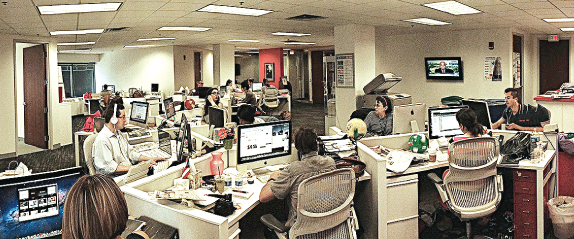
'Entrepreneurial Journalism' is not a fashion, but a requirement
MORE IN THIS SECTION
In today's changing media landscape one expression coined to define one aspect of our new reality makes us smile.
"Entrepreneurial Journalism."
Which is exactly what we have practiced in AL DÍA for more than 20 years.
It defines the profile of a practitioner of journalism who can write, but also "talk, walk and chew," all at the same time.
"Our small, new field has grown like weeds," says journalism professor Jeff Jarvis, who is hosting a one-day seminar on the subject for his teaching colleagues.
It will be held July 10 at the prestigious CUNY, a campus that boast its own Tow-Knight Center of Entrepreneurial Journalism.
Professor Jarvis, a former editor at the Wall Street Journal, is not afraid to spell it out:
Journalists were told in the past that "business was corrupting, evil," he says, and journalists, therefore, grew very protective of an implied public trust placed on their shoulders and accepted by their consciences.
"Dozen of journalism schools and foundations are now training and supporting the next generation of media leaders," not only to report, write and edit, but also to "close sales, capture audiences, and run businesses," he says.
Yes, learning how to innovate, take risks, run new business projects have become as important as learning just good "reporting and writing."
New classes in the most advanced schools of journalism in the nation now include coding, social media, data journalism, viral marketing, pitching business ideas, and, more importantly, closing the sale. Creatively, honestly, without sacrificing the public trust for simple monetary gain.
Who is going, then, to "save journalism" in America?
Take Warren Buffett, the octogenarian and savvy investor from Nebraska, now busy buying failing newspapers across the country.
In the other hand, look at the young innovators, some already working in new media shops like Huffington Post or TPM Media, Mashable or Buzzfeed, or those other still sleeping on the rough floors of their own dreams, unemployed or self-employed, working hard to earn a break in this new marketplace where multiple skills are not a fashion but a requirement.
I suppose Professor Jarvis is betting on the young who attend his classes.
However, as a veteran of legacy media, he must know good ideas need funding for them to happen.
Funding comes from few sources:
• First and foremost, pure sales, slow to come and difficult to earn in the open and highly competitive marketplace.
• Second, the "quick shot in the arm" of investment capital, coming from venture capital firms, equity funds, or "angel investors."
• Yet another source to finance journalism today is the aid coming from foundations.
All three, very hard to come by.
But not impossible, if you believe in the AL DÍA's experience, now two decades old, funded primarily by what is known in the business as "sweat equity".
Slowly but surely, we learned over 20 years to survive in the free market of advertising-supported media.
Although initially a strange subject to us, we mastered marketing and selling, learning by trial and error, while squeezing time to do also the journalism that would give meaning to the whole strenuous endeavor.
The AL DÍA Foundation, created five years ago, is a just intended to further the same cause that inspired the commercial enterprise:
Excellence in American journalism in an area in which it is most urgently needed —the multicultural America of the 21s century, one in which the Latino experience, we believe, is called to play a central role.
Hernán Guaracao is the Founder & Chairman of the AL DÍA Foundation, and the Founder & CEO of AL DÍA News Media, Philadelphia's premiere Latino News Media.





LEAVE A COMMENT:
Join the discussion! Leave a comment.